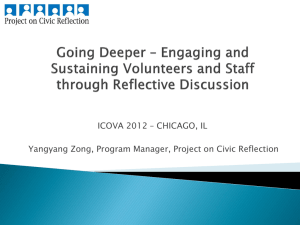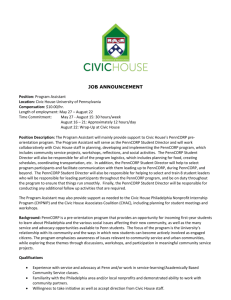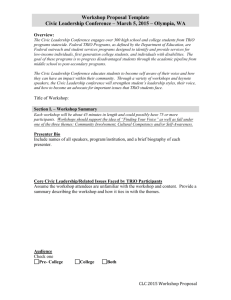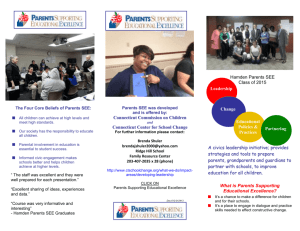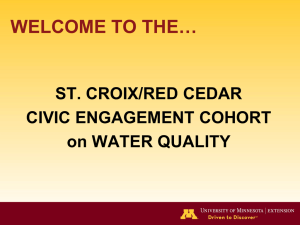Linked and Distinct: - Center for Civic Reflection
advertisement
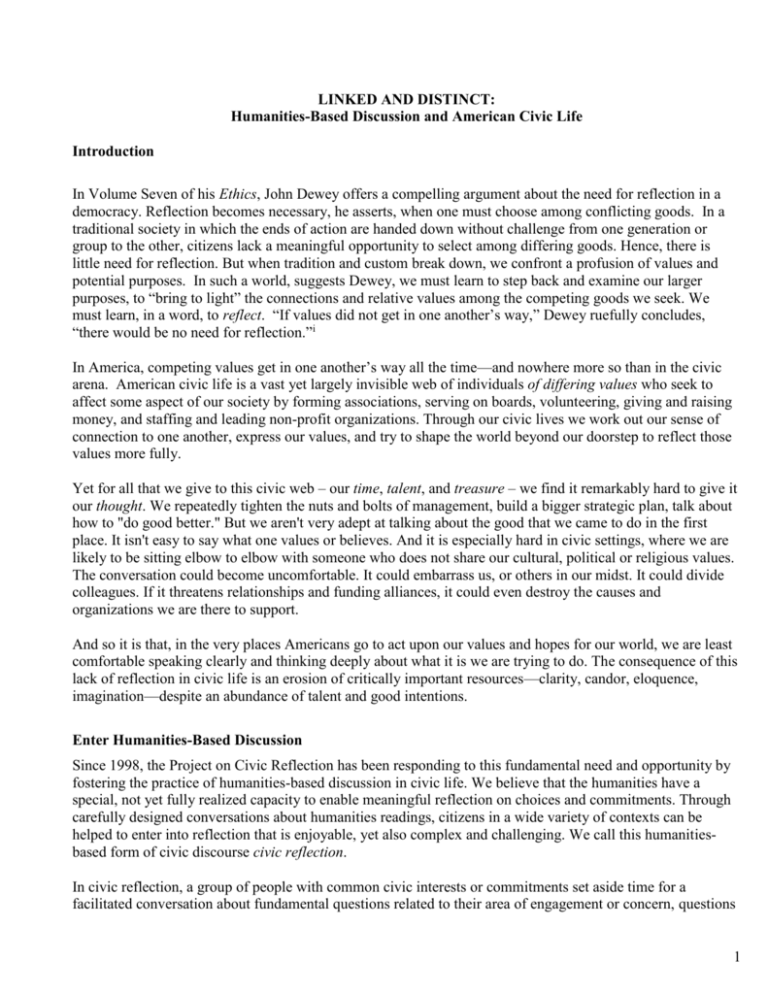
LINKED AND DISTINCT: Humanities-Based Discussion and American Civic Life Introduction In Volume Seven of his Ethics, John Dewey offers a compelling argument about the need for reflection in a democracy. Reflection becomes necessary, he asserts, when one must choose among conflicting goods. In a traditional society in which the ends of action are handed down without challenge from one generation or group to the other, citizens lack a meaningful opportunity to select among differing goods. Hence, there is little need for reflection. But when tradition and custom break down, we confront a profusion of values and potential purposes. In such a world, suggests Dewey, we must learn to step back and examine our larger purposes, to “bring to light” the connections and relative values among the competing goods we seek. We must learn, in a word, to reflect. “If values did not get in one another’s way,” Dewey ruefully concludes, “there would be no need for reflection.”i In America, competing values get in one another’s way all the time—and nowhere more so than in the civic arena. American civic life is a vast yet largely invisible web of individuals of differing values who seek to affect some aspect of our society by forming associations, serving on boards, volunteering, giving and raising money, and staffing and leading non-profit organizations. Through our civic lives we work out our sense of connection to one another, express our values, and try to shape the world beyond our doorstep to reflect those values more fully. Yet for all that we give to this civic web – our time, talent, and treasure – we find it remarkably hard to give it our thought. We repeatedly tighten the nuts and bolts of management, build a bigger strategic plan, talk about how to "do good better." But we aren't very adept at talking about the good that we came to do in the first place. It isn't easy to say what one values or believes. And it is especially hard in civic settings, where we are likely to be sitting elbow to elbow with someone who does not share our cultural, political or religious values. The conversation could become uncomfortable. It could embarrass us, or others in our midst. It could divide colleagues. If it threatens relationships and funding alliances, it could even destroy the causes and organizations we are there to support. And so it is that, in the very places Americans go to act upon our values and hopes for our world, we are least comfortable speaking clearly and thinking deeply about what it is we are trying to do. The consequence of this lack of reflection in civic life is an erosion of critically important resources—clarity, candor, eloquence, imagination—despite an abundance of talent and good intentions. Enter Humanities-Based Discussion Since 1998, the Project on Civic Reflection has been responding to this fundamental need and opportunity by fostering the practice of humanities-based discussion in civic life. We believe that the humanities have a special, not yet fully realized capacity to enable meaningful reflection on choices and commitments. Through carefully designed conversations about humanities readings, citizens in a wide variety of contexts can be helped to enter into reflection that is enjoyable, yet also complex and challenging. We call this humanitiesbased form of civic discourse civic reflection. In civic reflection, a group of people with common civic interests or commitments set aside time for a facilitated conversation about fundamental questions related to their area of engagement or concern, questions 1 like What obligations do we have to our neighbors? Why join one group and not another? What is a community? What do we expect of those we serve? Brief, thought-provoking readings from literature, philosophy, history or religion anchor the discussion. The facilitator asks interpretive questions rather than making pronouncements. These questions invite participants to articulate and examine their beliefs and values, explore the claims of the text, and consider the implications of both for the larger challenges of their civic work. Civic reflection stands apart from other contemporary civic dialogue models in two respects. First, it uses the rich textual resources and distinctive interpretive practices of the humanities to help citizens think and talk about their civic activity. Second, it explicitly aims at reflection, rather than consensus or action. Humanitiesbased discussion offers a rare opportunity, in the midst of action, for careful thinking and free discussion about fundamental concepts and personal values, without the pressure of a pledge card, position paper or additional committee assignment at the end. In the past decade, through the work of the Project on Civic Reflection and its partners, more than 3,000 people across America have participated in civic reflection conversations calibrated to their own settings and concerns. They may be young people clearing trails in Montana, or retirees volunteering at a food pantry in Ohio. They may be Rotarians giving to their community in Nebraska, or community organizers leading health reform in Hispanic neighborhoods in Illinois. They may in fact be anywhere on the “civic web.” The potential context for humanities-based discussion is truly as vast as civic life itself. Wherever people go to express their values and impress these values on a larger community, there exists a need to reflect on those values as well— and an opportunity for the humanities to help. What We are Learning about Impact Along with supporting civic reflection through seed grants, online resources, anthologies and trained facilitators, the Project on Civic Reflection is collecting data to find out whether and how civic reflection affects participants. The remainder of this paper summarizes what we have learned from an accumulated set of more than 600 participant surveys and interviews about the impact of civic reflection on participants. In brief, we have found that civic reflection primarily affects participants in three ways: reconnecting them with their values and beliefs; creating greater comfort with differing values and beliefs; and increasing civic commitment and stimulating individual action. In some cases, the effect of civic reflection has been to spur an overtly political action—as, for instance, when three members of a Maine civic reflection series decided to run for political office, a decision each candidate attributed in part to their civic reflection experience. But the primary impact of civic reflection might best be described as pre-political: it strengthens participants’ connections to their community and fellow citizens, their commitment to broadly civic forms of action on behalf of that community, and their comfort with diverse perspectives and values in civic life. 1. Reconnecting Citizens with Their Values and Beliefs Since 2003, the Nonprofit Center of Northeast Florida has been bringing together a new group of nonprofit leaders each year for UpLifting (NonProfit) Leadership, a program of reflective reading and discussion. Each cohort of leaders, drawn from philanthropic, cultural and service organizations in the Jacksonville area, meets regularly over the course of a year to discuss not 2 just the “how,” but the “why,” of nonprofit work. These leaders report that they feel both refreshed and reinvigorated, better able to think through and articulate the challenges and joys of their important work. As one participant wrote afterward, “The conversations led me to have an even higher sense of value as an non-profit leader; Made it clearer for me that I had chosen an important way to fulfill my personal life mission.” We often describe political activity as problem-based, starting in and seeking resolution of a problem. Yet such action is also fundamentally possibility-based. We may act in response to a problem. Yet we act because we trust in the possibility of a better way of living together in the world. As H. George Frederickson has observed, political actors focus upon solution of problems, but they implicitly seek to solve those problems in light of a better, fairer, stronger city, what he calls “the possible community.”1 One of the challenges of our civic discourse is to draw out those implicit ideals, those conceptions of the possible community. This is important first because our ideals nurture and sustain us—and second because, if unexamined, they may also obstruct and constrain us. If public deliberation is necessarily a problem-based discourse, civic reflection introduces a possibility-based moment. It gives citizens a chance to explore their hopes and motivations—to step back and think about the why, not just the how-to of civic life. In New Hampshire, a recent civic reflection series for state legislators on religion and civic life provided just such an opportunity. As one participating legislator observed, “It was always there – my values and beliefs in making decisions – but this discussion has brought it more to the forefront of my awareness.” A fellow legislator had this to say: This program has been extremely helpful. It has given me pause to stop and reflect on my own beliefs, challenging some of them and reinforcing others. It has been helpful to hear . . . other legislators from both parties answer difficult questions candidly. We rarely have that opportunity in the State House. It is noteworthy how appreciative these very busy elected officials were to have an opportunity for noninstrumental exploration of beliefs and motivations. We have heard similar appreciation from another hardpressed group of civic leaders, those who direct non-profit organizations. Consider this comment from one executive director after participating in “Up-Lifting Non-Profit Leadership,” the Florida civic reflection series described above: I found the entire experience to be very affirming. It gave me a greater understanding of exactly what I do and its importance in the big picture - it also helped me... think more clearly not just about who we are and what we are actually doing, but who we are called to be and how that may be changing - and what should not change. It helped me as a leader, deeply and personally. As this last comment suggests, civic reflection may have a special role to play in helping to counter the personal disconnection and subsequent disengagement that afflicts political and civic life. By providing a relatively safe and even enjoyable way to reconnect with motivating beliefs and values, as well as to better 1 H. George Fredrickson, How Community Works, (Kettering Foundation, 1999), p. 36. 3 understand the beliefs and values of others, civic reflection can help citizen-leaders remain engaged and energized for the work ahead. 2. Creating Greater Comfort with Differing Values and Beliefs At the center of a civic reflection conversation is a short, complex humanities reading—a poem, short story, historical document, philosophical meditation, or snippet of scripture, to name just a few possibilities. At its best, this reading functions in civic settings much as scripture does in religious settings: it expands and enriches the vocabulary of the interpretive community that gathers around it, providing a shared point of reference and allowing for an ongoing articulation of ideals, values and hopes. Yet, if properly selected and approached, the reading achieves this without imposing a single interpretation or doctrine. Civic reflection conversations use readings that do not impress a specific lesson—or inspire a specific action—so much as provoke a range of responses from participants. These texts “contain an excess of meaning” that overflows any one person’s understanding, inviting another, and another, and another reading of reality into the open. (According to the theologian David Tracy, this “excess of meaning” is the very definition of a classic text, although many of the texts we use, being contemporary, are not yet classics in the conventional meaning of that term2). Indeed, our research suggests that the range of interpretation itself is the single most important discovery for most participants. It is not so much what people say, as that they say different things, that surprises and even exhilarates participants. “Amazingly helpful to hear how fourteen different people read the story and contributed to the discussions,” commented a Chicago philanthropist. “That really opened my mind to new ideas and viewpoints.” “It never ceases to amaze me how two individuals can read the same material and come to such different conclusions,” remarked a Rotarian. “It was not only a surprise, it was fascinating!” The same fascination can be heard in the words of a teenage participant in a civic reflection series who wrote, “When comparing my comments to others, each comment showed how different people can express themselves when talking about one thing.” This pleasing discovery of difference is no less true in groups that appear homogenous, and where people have long assumed that they all ‘think alike.’ Consider, for example, a service and volunteering conference in Ohio, where participants (almost all of them AmeriCorps members or staff) walked out of a civic reflection session enthralled at “the various interpretations of the literary work” and equally at “the different reflections people can have about service.” Or consider this comment from a Rotary member in Lincoln, Nebraska, after participating in a “Reflective Philanthropy” conversation with fellow Rotarians: “What I did not realize before is the various motivations that fuel the giving of various people, all valid, all sensible, but meeting the different inner needs of the giver and recipients.” As these comments suggest, humanities-based discussion has two paradoxical effects—connecting people and at the same time freeing them to think as individuals. By entering into reflective conversation about a shared reading and shared set of concerns, participants gain a new sense of connectedness that counters the isolating drift of American life. As one non-profit executive put it, “I had a real sense of moving beyond the thinking that I’m the only one, that no one understands. We do understand each other; we have a lot more in common.” 2 David Tracy, Plurality and Ambiguity, (University of Chicago Press, 1994) p. 15. 4 And yet civic reflection also creates a comforting sense of difference. The same leader goes on to observe, “That’s the real success of the group—when we read a story together we didn’t get the same thing out of it. We drew upon our own experiences, who we are.” 3. Increasing Civic Commitment and Engagement In 2006, the Rhode Island Humanities Council joined with the Rhode Island Community Service Council to bring civic reflection to every AmeriCorps member in the state through a program called “Justice Talks.” Data gathered from participants shows a strong correlation between civic reflection and a positive AmeriCorps experience. More than two-thirds said that Justice Talks had improved their AmeriCorps experience. Seventy-nice percent said that Justice Talks had improved their relationships with other AmeriCorps members. And thirty-six percent said that they were more likely to sign on for another year with AmeriCorps because of Justice Talks. In the words of one volunteer, Justice Talks “has made me put myself in the shoes of those I am serving and made me want to continue to serve my community throughout my life.” When surveyed about their experience in Justice Talks and other programs, participants consistently tell us that civic reflection has deepened their commitment to engaging in civic life. They attribute this outcome both to the readings, and to the experience of thoughtful reflection and discussion with peers. “I feel that I will begin to avail myself of more opportunities to serve,” says a retired volunteer in Akron. “I will become more civic minded,” adds another. A Rotarian tells us that “The conversations have inspired me to develop stronger philanthropic habits.” Reinforcing this remark, a recent survey of civic reflection participants in the Nebraska Rotary pilot found that more than 80 percent of respondents felt that the conversation series had fostered a stronger commitment to service in general and to Rotary in particular. Along with a deepened commitment to civic engagement, participants report a range of changes in their civic activity. To give just a few examples: After reading [Mary Wilkins Freeman’s turn-of-twentieth century gothic tale] “Luella Miller,” I had a complete turn-around in my thinking about donor recognition. It wasn’t exactly what the reading was about, but my thinking shifted because of the reading. I stopped giving money to panhandlers on the street because I realized that I was giving out of guilt and with judgment—I now give more money to the Chicago Coalition to End Homelessness and the Greater Chicago Food Depository. Coming out of my medical/psychiatry residency training, the questions raised in this group have caused me to think more deeply about my career choices. I then decided to take a job that perhaps pays a little less but provides a tremendous service to my local community. As these sample comments suggest, participants report a wide variety of insights and subsequent changes in behavior as a result of civic reflection. They may give more, or just give differently; they may change jobs; they may approach staff conflict in a fresh way; they may have expanded their vision and expectations for their organization; they may feel more confident in their dealings with other board members; they may feel personally recharged, have questioned their own attitudes or beliefs, have new admiration for colleagues, and so forth. 5 In Conclusion A key finding from our data on civic reflection is precisely this variety of effect. Paradoxically, the experience of reading a shared text, reflecting on common activities, and discussing those readings and reflections in conversation with peers affects each person in a highly individual way. Participants walk away from civic reflection conversations feeling both linked and distinct—connected to others, yet inspired to act in accordance with their own convictions and beliefs. Does the finding that civic reflection moves people in many different directions undercut its value for our common life? On the contrary, it underscores that value. It suggests the unique capacity of humanities-based discussion, as a model of civic discourse, to reach and motivate citizens at the level of deeply held personal beliefs and choices, even as it fosters a sense of connection across differences. It is this unique capacity that makes humanities-based discussion such a promising—and needed—resource for civic life. i John Dewey, The Later Works, 1925-1953, Volume 7 (Southern Illinois University Press, 1981), pp 210-212. 6


